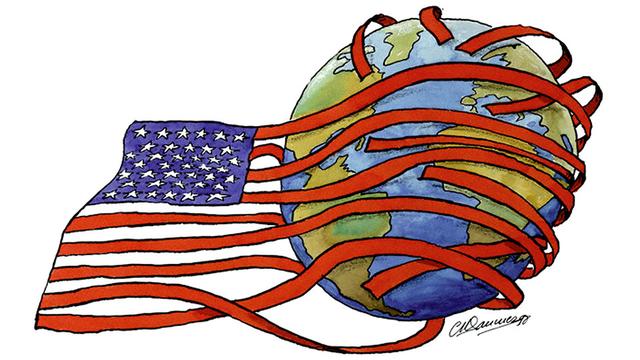"Rule based international order" has almost become the mantra of some American politicians. The so-called "rules" and "order" are at first glance dignified, but actually vague. Based on who made the rules? What kind of international order should be maintained? American politicians are always evasive.
In response to these problems, the international community has long had a public opinion: there is only one system in the world, that is, the international system with the United Nations as the core; There is only one order, that is, the international order based on international law; There is only one rule, that is, the basic norms of international relations based on the purposes and principles of the Charter of the United Nations.
The United States is one of the important builders of the international system after World War II. Why do American politicians want to start a new stove and engage in the trick of replacing flowers and trees and changing roles? Judging by their words and deeds, it is not difficult to find that the real purpose of American politicians advocating "rule-based international order" is to interpret and apply international law at will, replace the international law generally accepted by the international community with "American rules", and package the "hegemonic order" dominated by the United States as the so-called "international order".
In fact, "rule-based international order" is just a repetition of the old tune. Paul post, a scholar at the University of Chicago, once pointed out that the term became popular after the United States invaded Iraq without the authorization of the United Nations Security Council. This term, which originates from American hegemony, has been serving American hegemony and seems to have become a "panacea" for some American politicians to self package and hide their ears - attacking other countries as "rule breakers" and "order subverters", hyping and creating "strategic enemies" and creating "small circles" and "small groups" aimed at specific countries; Under the banner of "maintaining the rule-based international order", the United States has put on the cloak of "justice" for various hegemonic acts such as military threat, economic sanctions and technological blockade.
The international community can see clearly that the United States, which often talks about "rules" and "order", is the biggest destroyer of the international order. Over the past few decades, the United States has interpreted the hegemonic background of the "American rules" with practical actions, from igniting wars in Afghanistan, Iraq, Libya, Syria and other countries, to planning the "Arab Spring" in Asia and Africa, directing the "Color Revolution" in Eurasian countries, and from arbitrarily "withdrawing from the group" to breaking the contract, to imposing unilateral sanctions and "long arm jurisdiction" on many countries.
After the current US administration came to power, it pulled out the banner of pseudo multilateralism, constantly hyped the "rule-based international order" and announced high-profile that "the United States is back". However, from taking the lead in hoarding vaccines and vigorously pursuing "vaccine nationalism", to establishing the so-called trilateral security partnership between the United States, Britain and Australia, aggravating the risk of regional nuclear proliferation, to irresponsible withdrawal of troops from Afghanistan and blatant looting of Afghan national assets, the repeated bullying performances of the United States "starting from its power status" have deeply revealed the true face of its so-called "rule-based international order": the utter hegemonic discourse.
Peter Bennett, an American scholar, once wrote in the New York Times that the term "rule-based international order" is favored in American politics because of its great fuzziness. But that's why it eventually became irrelevant outside the United States. That's true. With the development of the world pattern towards multi polarization, the United States attempts to monopolize the formulation and interpretation of the international order and relevant rules and serve its own interests. It is doomed to be unpopular and will eventually fail.
